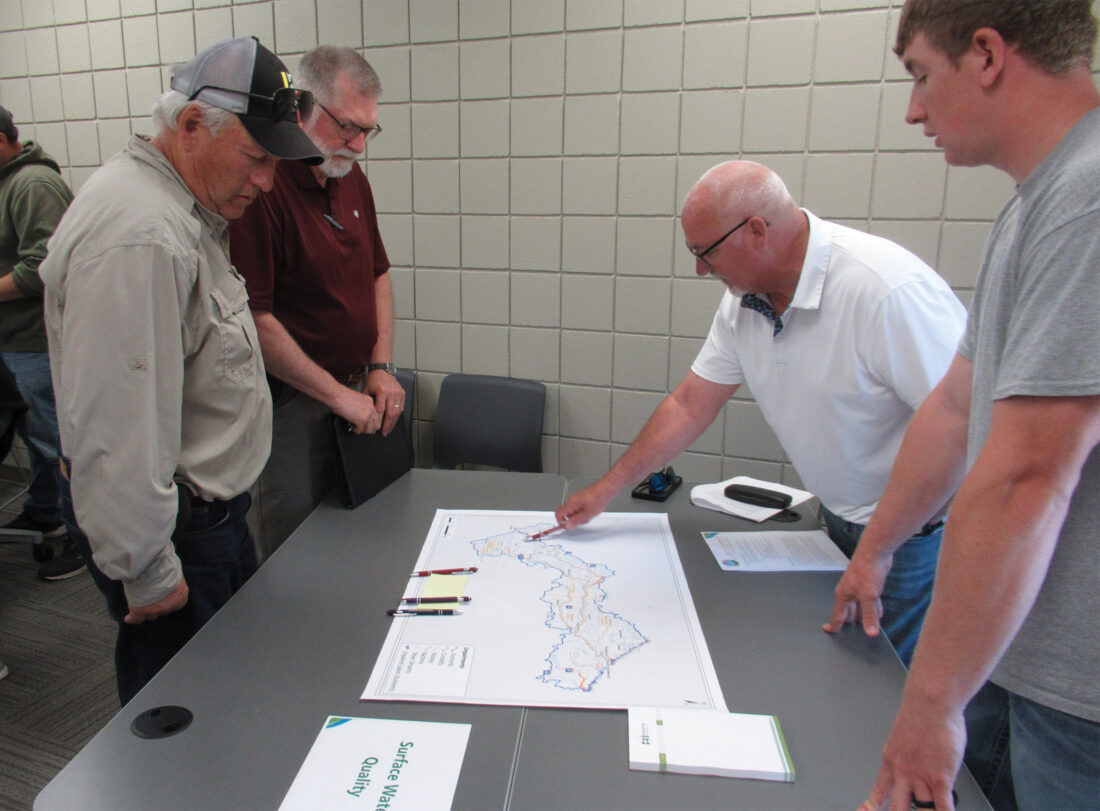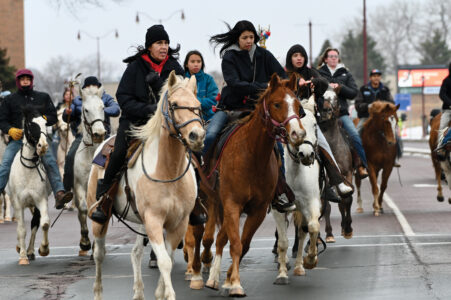Conservation efforts discussed
MERIT Center meeting kicks off development of 10-year management plan

Photo by Deb Gau Mike Weckwerth, with the Minnesota Pollution Control Agency, gestured as he answered questions about a water quality map for the Redwood River watershed on Wednesday. Water quality was one of the topics that a regional partnership was looking for public feedback on as they develop a 10-year management plan for the watershed.
MARSHALL — A collection of sticky notes was growing on a series of maps of the Redwood River watershed.
Area residents added notes for concerns about the watershed — some called for protecting water quality on area lakes, while quite a few notes were focused on topics like erosion and flooding.
It was feedback that members of a regional partnership wanted to hear. On Wednesday, a public meeting was held at the MERIT Center in Marshall to discuss the Redwood River One Watershed, One Plan.
“This meeting is to officially kick off an effort that will be for the next year and a half or so, to develop a 10-year comprehensive watershed management plan,” said presenter Rachel Olm with Houston Engineering. The plan will help existing local water management groups get state funding and meet their goals for protecting the Redwood River watershed, she said.
“The focus is on voluntary conservation efforts,” Olm told an audience including area residents and farmers, and representatives of area counties and cities.
“We are not here as part of this planning process to create a new layer of government,” she said. “It’s also not a regulatory program, so we’re not creating something like the buffer law.”
Kick-off meetings for the planning process were held in Lake Benton on Tuesday, and in Marshall and Redwood Falls on Wednesday.
Presenters said the Redwood River watershed includes 563,000 acres of land in six counties, stretching from the river’s source near Ruthton to the Minnesota River at Redwood Falls.
“The One Watershed, One Plan is a planning process that’s administered by the (Minnesota) Board of Water and Soil Resources,” Olm said. “What they do is, they award planning grants to local government entities that join together voluntarily, to decide to plan for natural resources within a watershed boundary.”
The Redwood River One Watershed, One Plan partnership was created through an agreement between groups including Lincoln, Lyon, Murray, Pipestone and Redwood counties, area Soil and Water Conservation Districts, the Redwood-Cottonwood Rivers Control Area, Area II Minnesota River Basin Projects, and the cities of Ghent, Marshall and Redwood Falls. Their planning process got started with the help of grant funds from BWSR.
Olm said completing the planning process and getting an approved management plan would open the door to state funding dollars for projects in the Redwood River watershed.
“For the Cottonwood River watershed, directly south of you, that’s about $1 million a year,” Olm said. “So it is a sizable amount of money that’s available for implementing the things that are in your plan.”
Hearing what issues are important to the public is a crucial part of the planning process, said Olm and RCRCA Executive Director Kerry Netzke. That was where this week’s meetings came in.
People at the meeting had a chance to weigh in on different issues in the Redwood River watershed. Some of the major areas of discussion included water quality in rivers and lakes, the amount of water flowing through the watershed, and protecting groundwater and drinking water.
Erosion and flooding were two topics that got a number of comments at the meeting. One written comment talked about flooding concerns in the city of Ghent. In a group discussion at a different table, Marshall Public Works Director Jason Anderson asked about opportunities to support building additional retention ponds in the city.
At Tuesday’s kickoff meeting in Lake Benton, a lot of people also voiced an interest in improving water quality in the lake, Olm said. Runoff that causes algae blooms was a concern facing Lake Benton, she said.
Meeting organizers said there are other chances for the public to get involved in the watershed planning process. Area stakeholders are invited to be part of an advisory committee that will meet three or four times throughout the planning process. Those stakeholders can include members of agriculture and producer groups, conservation and environmental organizations, and more, Netzke said.
People who would like to be part of the advisory committee should contact the RCRCA office in Marshall, at 507-532-1325.



